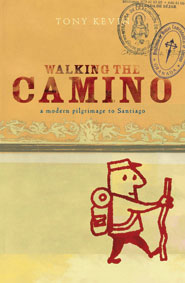“During 8 weeks between May and July 2006, I walked a long diagonal line across much of the map of Spain,...”
So starts the book. Tony covered approximately 1200 km, walking between 20 to 35 kilometers a day, from Granada to Santiago.
 “Every morning towards 11 am, hundreds of hot, tired, and dusty pilgrims stream into Santiago Cathedral for the daily pilgrims’ Mass there, and to collect their "compostela' from the cathedral office, the precious certificate of completion of journey that will be hung proudly on walls back home,...”
“Every morning towards 11 am, hundreds of hot, tired, and dusty pilgrims stream into Santiago Cathedral for the daily pilgrims’ Mass there, and to collect their "compostela' from the cathedral office, the precious certificate of completion of journey that will be hung proudly on walls back home,...”
This is a book not to be hurried through. It is not a murder mystery to be rushed through to the end. It is not a compelling biography. It is a book to be savoured, to be tasted, to be enjoyed leisurely.
The author covers Spanish history, geography, politics, the people, culture, the buildings, religion, wars, and so on and also found his command of the Spanish language improved.
But what is a Camino?
It is a many centuries-old pilgrim way across Spain and Portugal, marked by famous yellow arrows.
There are several ways of walking the Camino. There are long routes and shorter ones. Some start in Southern France, some start in southern Spain, but all end up in Santiago in north-west Spain.
Why a pilgrimage?
In the early days there was "the firm belief that to make such an arduous and dangerous journey to faraway holy places would carry great spiritual and temporal rewards".
Why Santiago?
It is said that the apostle St James is buried there. In a battle at Clavijo in 844 AD St James appeared in a vision to despairing Christian fighters inspiring them to victory. A pilgrimage shrine was built which became the city of Santiago.
Tony tried to do the traditional things which meant a Jesuit priest was there to bless the pilgrimage. Then he set off in new khaki pilgrim gear, walking boots, floppy hat, rucksack and wooden staff (home made " and he lists 16 uses for the staff).
Then there are socks.
Did you know that heavy woolen socks are not the best for long and hot walking? So buy your boots a little loose, wear 2 pairs of lightweight synthetic walking socks. "By always walking in two pairs of socks, the outer sock sticks to the boot and the inner to the skin; this means that most of the rubbing that would cause blisters takes place between the two sock layers…"
There was always cheap overnight accommodation available. Most of the time during the day he walked alone, meeting up with fellow travelers at night.
Tony has lovely detailed descriptions of the countryside he walked through, of the people he met and the food he was offered. There is a whole chapter on politics which the reader is advised to skip if not interested in this topic.
There was an unexpected bout of illness during the walk. Later he realised that eating and drinking as if he was at home was not a good thing. Surprisingly, he needed to cut back on food intake. After a month on the road, walking, he had not lost any weight at all.
He now only ate what he needed and drank more water, then found he was losing about 1 kg a week. "By the time I got to Santiago I was eight kilograms lighter, my belt was three notches narrower, there was a spring in my step and I felt fifteen years younger."
Spiritual growth.
"Spiritual growth can steal up on you: it does not have to be a moment of blinding, dramatic revelation" ". Tony found it "more of a quiet and slow healing process, re-discovering a calm after the storm that had been my life for the past few years."
Tony's own words describe it best: "My pilgrimage opened my heart wider to God; it washed away my emotional constrictions and defence mechanisms; it enabled me to pray more freely and unforcedly than ever before in my life. It gently but insistently urged me to confront my life, warts and all" In Spain on the Camino, I was living my religion rather than thinking about it at an intellectual level."
The book beautifully shows God's beauty in the Spanish countryside. "Spain taught me that a country and its culture can go through hell on earth and still come out at the end as a decent and caring human society. Human societies have enormous recovery powers, and I believe this is a gift from God."
For Tony it was a healing experience. He is now happier and more relaxed, and more at peace with God.




























